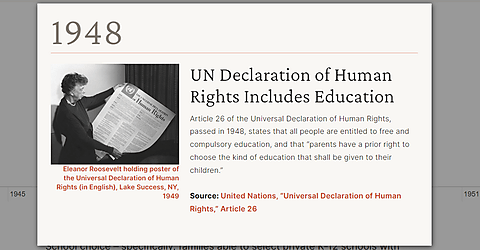Universal Declaration of Human Rights: Enshrines Education Choice to Defend Freedom

This week marks the 75th anniversary of the United Nations’ Universal Declaration of Human Rights. The Declaration’s overall thrust and impact are matters of ongoing debate, and I won’t weigh in on them. But it contains a pronouncement that is very important to the school choice movement:
Parents have a prior right to choose the kind of education that shall be given to their children.
This, as cited on Cato’s School Choice Timeline, is from Article 26 of the Declaration. The article’s first two parts prescribe what education should be and do, and are not major departures from oft‐stated goals of public schooling. What is a major departure is an emphasis on the right to choose.
The UN Declaration, importantly, precedes the US Supreme Court’s 1954 Brown v. Board of Education decision, which declared decades of segregation in public schooling unconstitutional and set off years of evasion in many southern states. Included in that resistance were voucher plans that provided funding for families to choose private, typically all‐white, private schools. Many choice opponents point to this to assert that the school choice movement is rooted in evil: segregation.
What the Declaration establishes first is that belief in a right to choose in education preceded Brown and was asserted internationally. The idea of choice was not suddenly conjured up to defeat American desegregation.
More importantly, the Declaration includes choice because it is a defense against oppressive government, which certainly describes Jim Crow states. It was argued by many Declaration drafters that parents needed their right to choose enshrined lest the state hold too much power, a fear that was top of mind given the weaponization of free, compulsory public schooling in just‐defeated Nazi Germany. Diverse values and beliefs must be able to coexist on a level playing field.
Of course, as our timeline shows, school choice predated both the Declaration and Brown by well more than a century. Because people have always had diverse needs and values, and government schooling has never been consistent with that.





